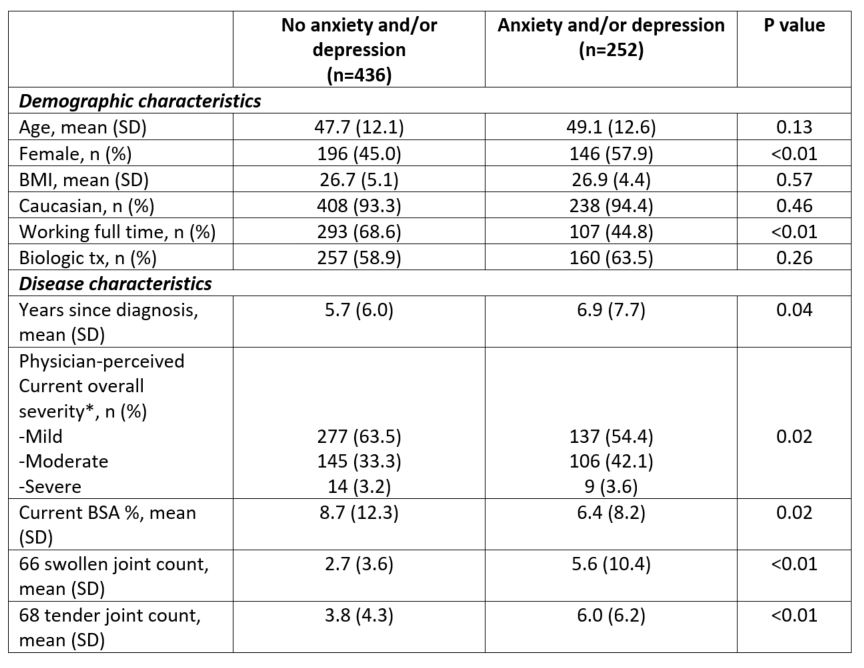Session Information
Date: Friday, November 6, 2020
Session Type: Poster Session A
Session Time: 9:00AM-11:00AM
Background/Purpose: Anxiety and depression are comorbidities among PsA patients. The impact of anxiety and depression on outcomes in PsA patients has not been characterized in a real-world clinical setting. The objective of this study was to describe the prevalence of anxiety and/or depression in PsA patients, assess concordance in reported anxiety and/or depression between patients and physicians, and compare clinical and patient reported outcomes (PROs) in patients who report anxiety and/or depression and those who do not.
Methods: A cross-sectional study among patients with PsA recruited by rheumatologists and dermatologists was conducted in France, Germany, Italy, Spain, UK and US. Data were collected Jun-Aug 2018 via physician-completed patient record forms and patient self-completed forms. Physicians reported patient demographic, disease characteristics and diagnosed anxiety and/or depression. Patients reported experience of PsA-related anxiety and/or depression, quality of life [QoL] (EQ5D-5L), work productivity (WPAI), disability (HAQ-DI), and disease impact (PsAID12). Patients were compared according to patient reported anxiety and/or depression using parametric tests and non-parametric tests. Multivariate regressions explored impact of anxiety and/or depression on PROs. Models adjusted for age, gender, employment status, BMI, no. of joints affected, body surface area (BSA).
Results: Data were collected from 688 physician-patient pairs (524 EU; 164 US). Physicians reported anxiety and/or depression in 14.2% of patients (EU 13.3%; US 16.2%), while 36.6% (EU 36.3%; US 37.8%) of patients self-reported anxiety and/or depression. 71.4% of physician-patient pairs agreed on anxiety and/or depression presence or absence (Kappa = 0.31, fair agreement). Patients with anxiety and/or depression had worse QoL, higher work impairment, and greater disability (Table 2).
Conclusion: After adjusting for demographic and clinical factors, patients with anxiety and/or depression were found to have worse QoL, work productivity, and disability outcomes than those without. Differences between patient and physician reports of anxiety and/or depression suggest that physicians may not be aware of the extent to which PsA patients experience anxiety and/or depression.
 Table 1: Demographic and clinical characteristics by patient-reported anxiety and/or depression
Table 1: Demographic and clinical characteristics by patient-reported anxiety and/or depression
 Table 2: Impact of anxiety or depression on PROs*
Table 2: Impact of anxiety or depression on PROs*
To cite this abstract in AMA style:
Gossec L, Walsh J, Michaud K, Holdsworth E, Peterson S, Meakin S, Booth N, Chakravarty S, Piercy J, Ogdie A. Anxiety and Depression in Psoriatic Arthritis (PsA) – Prevalence and Impact on Patient Reported Outcomes: Real-World Survey in the US and Europe [abstract]. Arthritis Rheumatol. 2020; 72 (suppl 10). https://acrabstracts.org/abstract/anxiety-and-depression-in-psoriatic-arthritis-psa-prevalence-and-impact-on-patient-reported-outcomes-real-world-survey-in-the-us-and-europe/. Accessed .« Back to ACR Convergence 2020
ACR Meeting Abstracts - https://acrabstracts.org/abstract/anxiety-and-depression-in-psoriatic-arthritis-psa-prevalence-and-impact-on-patient-reported-outcomes-real-world-survey-in-the-us-and-europe/
